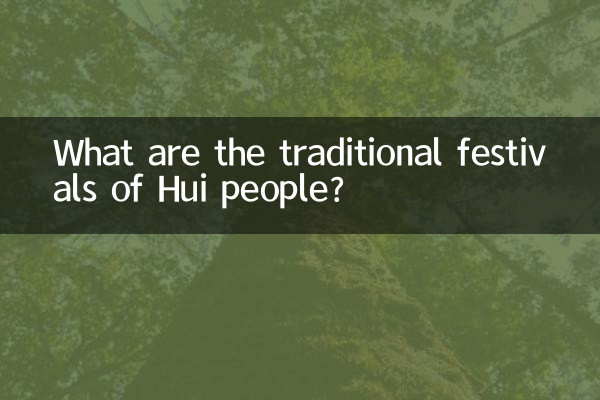What are the traditional festivals of Hui people?
As one of the ethnic minorities in China, the Hui people have rich traditional culture and unique festival customs. Most of the Hui festivals are related to Islamic beliefs, and they also incorporate some local cultural elements. The following are the main traditional festivals of Hui people and their characteristics:
1. List of major traditional Hui festivals

| Festival name | Time (Islamic calendar) | Main customs | Cultural significance |
|---|---|---|---|
| Eid | October 1 | Bathing, wearing new clothes, worshiping together, giving each other oil fragrance | Celebrating the end of Ramadan and thank God |
| Gurbon Day | December 10 | Sacrifice, alms the poor, family gatherings | Memorial to the loyalty of the prophet Ibrahim |
| Holy Day | March 12 | Reciting scriptures and praising the saints, telling the deeds of the saints, and having a | Memorial to the Birth and Death of Muhammad |
| Fatumai Festival | June 15 | Female gatherings, alms, and commemoration of Fatumai | Memorial to Fatuma, daughter of Mohammed |
| Climbing the Sky Festival | July 27 | Nighttime service, telling stories about climbing to the sky | Memorial to Mohammed's night journey |
2. Cultural characteristics of Hui festivals
1.Combination of religious and national: Most Hui festivals originate from Islam, but after long-term development, they have formed unique national characteristics. For example, foods such as oil fragrance and purse made during Eid al-Fitr have become representative of Hui food culture.
2.Strong community participation: Hui festival activities are usually centered on mosques and the entire community participates together. Collective services, dinners and other activities have strengthened the sense of national identity and community cohesion.
3.Pay attention to charity and sharing: During festivals such as Gurbang Festival, the meat after slaughtering is distributed to relatives, friends and poor people, reflecting the charitable spirit advocated by Islam.
3. Modern changes in Hui festivals
With the development of society, Hui festivals have also shown new characteristics:
1.Diversified holiday celebrations: In addition to traditional religious rituals, modern elements such as literary and artistic performances and sports competitions have been added to attract more young people to participate.
2.Expand cultural communication channels: Through new media forms such as short videos and live broadcasts, more people can understand the Hui festival culture.
3.Increased cross-cultural exchanges: In the city, Hui people celebrate the festival together with other ethnic groups, promoting cultural integration.
4. The relationship between popular topics on the Internet and Hui festivals in the past 10 days
| Hot Topics | Relevant points | Discussion hot topic |
|---|---|---|
| Ethnic food production | Methods for making traditional food oil fragrance on Eid al-Fitr | high |
| Protection of intangible cultural heritage | Imperial declaration of Hui festival customs | middle |
| Urban ethnic minority culture inheritance | How urban Hui people maintain holiday traditions | high |
| Religion and modern society | The significance of Islamic festivals in modern society | middle |
5. How to experience Hui festival culture
1.Visit the mosque: During the main Hui festivals, many mosques will be open to visit, but they need to pay attention to dress appropriately and respect religious etiquette.
2.Taste the holiday food: Traditional delicacies such as oil fragrance, purée, and hand-grabbed mutton are important windows to understand Hui culture.
3.Participate in community activities: Some Hui settlement areas will organize cultural performances, cultural exhibitions and other activities to be opened to the public.
4.Learn basic etiquette: Understand the basic taboos of Islam, such as not drinking alcohol or eating pork, to show respect.
The traditional Hui festivals are not only an expression of religious beliefs, but also an important carrier of national culture. With the development of society, these festivals are maintaining the traditional core while constantly absorbing new elements of the times and showing vigorous vitality. By participating in and understanding Hui festivals, we can better understand this hardworking and wise nation and feel the diversity of Chinese culture.

check the details

check the details